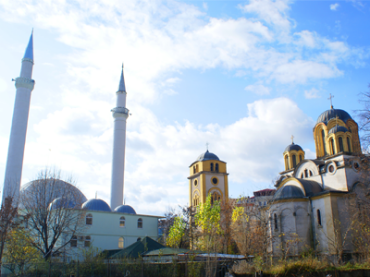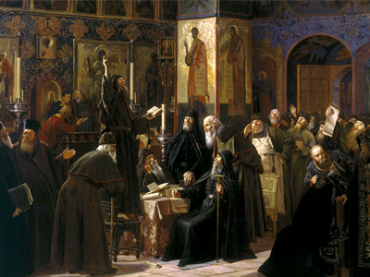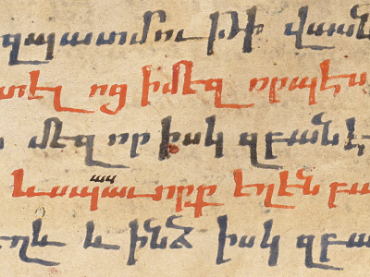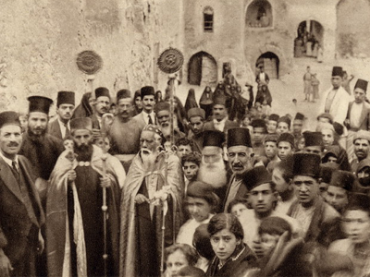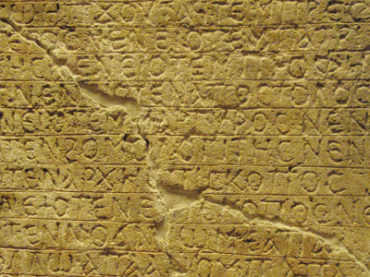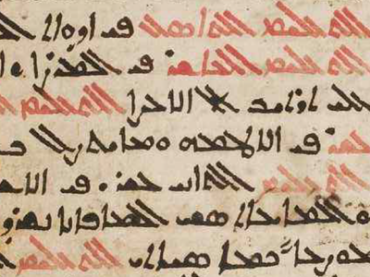Syriac and Eastern Christianity
Reliquary of Ancient Ecclesiastical Laws
Reliquiae Iuris Ecclesiastici Antiquissimae
ISBN: 978-1-59333-988-3
A notable resource for both church historians and linguists, this work of Lagarde contains both Syriac and Greek materials concerning ancient ecclesiastical laws. A number of ancient documents are cited in this unusual collection. Half of this collection is presented in the original Syriac and half in the original Greek. All introductions and notes are written in Latin. Intended for the serious linguist and church historian, this work requires language skills to unravel. As a collection of materials that had been inaccessible up to Lagarde’s time, this volume also serves as a period piece containing a fresh view of writings that helped inform the growth of canon law.
$159.00
Katalog der Islamischen, Christlich-Oreientalischen, Judischen und Samaritanischen Handschriften der
By K. Vollers
Series: Kiraz Historical Catalogues Archive 5
ISBN: 978-1-59333-930-2
This catalogue presents the Islamic, Oriental Christian, Judaic and Samaritan manuscripts in the University library of Leipzig’s collection. The largest part of the material is Islamic, and it is presented here according to categories. Manuscripts are described by title (if known) and a brief summary of the contents. Dimensions for most of the pieces are given as well. The Christian material includes manuscripts in Arabic, Syriac, Coptic, Ethiopic, and Georgian. A numerical concordance adds to the utility of this important manuscript collection.
$211.00
Coptic Monuments
Catalogue Général des Antiquités Égyptiennes du Musée du Caire
By W. E. Crum
Series: Kiraz Historical Catalogues Archive 6
ISBN: 978-1-59333-931-9
In this historic catalogue, Crum presents the Coptic monuments of the Museum of Cairo. Although given a French title, the contents of this book are written in English. Some of the more striking items are presented with beautifully drawn sketches of relevant sections of the source. As a museum book, this catalogue is amply illustrated with 57 black and white plates. A variety of artifacts are described: manuscripts, ostraca, and stelae, and indices round out the utility of this volume. A specialized collection from early Christian Egypt, this book will be welcomed by specialists in Coptic materials still found in their native land.
$143.00
Catalogue of the Turkish Manuscripts in the British Museum
By Charles Rieu
Series: Kiraz Historical Catalogues Archive 7
ISBN: 978-1-59333-932-6
This volume records and describes the 483 Turkish manuscripts in the British Museum at the time of the author. Most of the manuscripts are in Western Turkish, and a few in Eastern. The material is helpfully categorized according to the area of particular concern to the manuscript. Various aspects of Islamic religious practice are covered by several manuscripts. Other general areas represented are history, sciences, the arts, philology, and poetry. The Eastern Turkish materials are given their own section. Each manuscript is meticulously described, and the volume contains useful indices of titles, personal names, and subjects. A must have for any Turkologist, this historic catalogue is once again available.
$174.00
Jacob of Sarug’s Homily on the Transfiguration of Our Lord
Metrical Homilies of Mar Jacob of Sarug
Translation and Introduction by Thomas Kollamparampil
Series: Texts from Christian Late Antiquity 13
ISBN: 978-1-59333-934-0
This edition of Mar Jacob of Sarug's (d. 521) homily on the Transfiguration emphasizes the unity of the Old and New Testament. Jacob focuses on the symbolism of the apostles Jesus brings with him. Moses, the head of prophecy, and John, the beauty of apostleship, come together and Elijah and Simon are joined so that the keys Peter received over creation might be ratified. The volume constitutes a fascicle of The Metrical Homilies of Mar Jacob of Sarug, which, when complete, will contain the original Syriac text of Jacob's surviving sermons, fully vocalized, alongside an annotated English translation.
$36.00
Jacob of Sarug’s Homily on the Presentation of our Lord
Metrical Homilies of Mar Jacob of Sarug
Translation and Introduction by Thomas Kollamparampil
Series: Texts from Christian Late Antiquity 15
ISBN: 978-1-59333-936-4
This edition of Mar Jacob of Sarug's (d. 521) homily on the Presentation of our Lord in the Temple develops the character of Simeon. The author himself asks Simeon how we should understand his supplication. Simeon explains his wonder at Jesus offering the turtle doves, creatures which Jesus himself fashioned with the Father, presaging Jesus’ self-offering. The volume constitutes a fascicle of The Metrical Homilies of Mar Jacob of Sarug, which, when complete, will contain the original Syriac text of Jacob's surviving sermons, fully vocalized, alongside an annotated English translation.
$32.00
Jacob of Sarug’s Homily on the Holy Sunday of the Pentecost
Metrical Homilies of Mar Jacob of Sarug
Translation and Introduction by Thomas Kollamparampil
Series: Texts from Christian Late Antiquity 16
ISBN: 978-1-59333-937-1
This edition of Mar Jacob of Sarug's (d. 521) homily on Pentecost draws a comparison between the Upper Room where the disciples receive the Holy Spirt and the Tower of Babel. The division of the tongues at Babel was a sign that the Good News would be spoken in all tongues. The One who divided the tongues at Babel gave the tongues of fire as well. The volume constitutes a fascicle of The Metrical Homilies of Mar Jacob of Sarug, which, when complete, will contain the original Syriac text of Jacob's surviving sermons, fully vocalized, alongside an annotated English translation.
$31.00
Die Statthalter von Ägypten zur Zeit der Chalifen
ISBN: 978-1-59333-939-5
An original exploration into the governors of Egypt under the caliphs, this seminal study of Wüstenfeld has remained essential reading on the topic since its original publication in the 1870s. Originally published in four parts, this edition contains the entire study in its original German. A thorough and meticulous record of the rulers of Egypt during the period of the caliphs, this book should not be overlooked by students of the Islamic culture of Egypt. Written from a lifetime of study in the field, Wüstenfeld’s sharp outlines of the governors and their influence in the growth and development of Egypt under Muslim leadership hold an authority and insight that make the book a desirable addition to the library of Arabists and scholars of Egypt alike.
$144.00
Jacob of Sarug’s Homilies on Elijah
Metrical Homilies of Mar Jacob of Sarug
Translation and Introduction by Stephen A. Kaufman
Series: Texts from Christian Late Antiquity 18
ISBN: 978-1-59333-942-5
This volume collects all of Mar Jacob of Sarug's (d. 521) extant homilies on the prophet Elijah. In these homilies Jacob shows a remarkable sensivity to the human motivations of the biblical characters which was quite rare in ancient biblical exegesis. The volume constitutes a fascicle of The Metrical Homilies of Mar Jacob of Sarug, which, when complete, will contain the original Syriac text of Jacob's surviving sermons, fully vocalized, alongside an annotated English translation.
$99.00
Manuscrits Syriaques Conservés dans la Bibliothèque des Maronites d’Alep (Syrie)
Series: Gorgias Eastern Christian Studies 5
ISBN: 978-1-59333-956-2
The Maronite Library of Aleppo is one of the most important collections of manuscripts in Syria. This catalogue gives the first detailed description of the Syriac manuscripts, also containing images and indices of titles, personal names, subjects and places.
$167.00
Seeing Egypt and the Holy Land
By E. M. Newman
Series: Kiraz Historic Travels Archive 20
ISBN: 978-1-59333-911-1
With the characteristic compelling photographs that accompany his work, E. M. Newman here presents his unique outlook on Egypt and the Holy Land. Written with the competence of a professional travel writer, Newman takes the reader through his arrival in Egypt by ship and on a virtual tour of the noted wonders of that land. His impressions of Egypt, Palestine, the Arabian Desert and Sinai are all dutifully recorded. Finishing up with the accounts of his main New Testament sites, Nazareth, the Jordan River, Bethlehem, and Jerusalem, this travelogue contains a wealth of impressions and memories. Illustrated with over 300 photographs, this volume gives a visually descriptive tour of these ancient lands.
$185.00
The Palestinan Syriac Lectionary of the Gospels
Series: Kiraz Theological Archive 33
ISBN: 978-1-59333-917-3
The work of the remarkable sisters Agnes Smith Lewis and Margaret Dunlop Gibson, this lectionary of what is now known as Christian Palestinian Aramaic, was re-edited in the light of two manuscripts from the Sinai, which they recovered, and from Paul de Lagarde’s Evangeliarium Hierosolymitanum. An important document for the textual criticism of the New Testament as well as for the early practice of the church, Lewis and Dunlap added to its value by composing this light “critical edition.” Presented in Syriac with English annotations to the Greek text of the Gospels, this useful study will be welcome by New Testament scholars and Syriac scholars alike.
$181.00
The Patriarchate of Alexandria
Series: Kiraz Theological Archive 30
ISBN: 978-1-59333-050-7
The first volume of an ambitious project to document the history of the early church, this is one of John Mason Neale’s crowning achievements. Meticulously researched, Neale’s treatment of the early church in Egypt is among the required reading of any student of oriental Christianity still today. Beginning with the traditions of St. Mark’s foundation of the Egyptian church, the developments of Christianity are traced up through the controversies associated with Nestorius and the Council of Chalcedon. In Neale’s characteristically readable style, the early stages of Eastern Christianity and its noteworthy figures are presented here with historical accuracy and authority. The origins of monasticism, the troubles and triumphs of St. Athanasius, the Arian heresy, and the ecumenical councils are all treated in this important study of the church in Egypt.
$167.00
Geschichte der spät- und neusyrischen Literatur
Series: Gorgias Neo-Aramaic Studies 12
ISBN: 978-1-59333-219-8
More than a literary survey, this introduction to the history of late and Neo-Syriac (Neo-Aramaic) covers the works of the past several centuries. Macuch begins with the post-Mongolian period to the end of the 18th century. For the 19th century, Macuch considers the situation of the Assyrians in this period, including the American, Anglican, and Russian Orthodox missionary enterprises in Urmia, noting the writers of the foreign missions. For the twentieth century he includes literature from the period of the wars up to the 1970s. Various East-Syriac and West-Syriac authors of the Chaldean and Church of the East, and Syrian Orthodox and Maronite traditions, as well as the Syrian literature of Malabar in southern India are also considered.
$214.00
The History of the Holy Mar Ma‘in
With a Guide to the Persian Martyr Acts
ISBN: 978-1-59333-222-8
The History of Holy Mar Ma‘in of Sinjar tells the story of a Sasanian general during the time of Shapur II (309-79) who suffered persecution after his conversion to Christianity. In this volume, the first in this new series from Gorgias Press, Sebastian P. Brock provides the first edition ever of the Syriac text of the History of Ma‘in as well as the first full translation of it. This volume also includes a basic guide to the whole corpus of Persian Martyr Acts as well as useful indices to these numerous texts.
$44.00
Divine Contingency
Theologies of Divine Embodiment in Maximos the Confessor and Tsong kha pa
Series: Gorgias Eastern Christian Studies 7
ISBN: 978-1-59333-970-8
This work explores the points of contact, as well as the differences between the distinct notions of divine embodiment developed by Maximos the Confessor (580-662), one of the greatest Greek Fathers, and Tsong kha pa (1357-1419), arguably the most important thinker in the history of Tibetan Buddhism. Both authors developed a spiritual theology where natural contemplation and the practice of the virtues are invested with a transformative value and are construed as a response to a cosmic intelligence, which sustains the universe, but also becomes manifest in history.
$193.00
Aphrahat the Persian Sage and the Temple of God
A Study of Early Syriac Theological Anthropology
ISBN: 978-1-59333-679-0
Aphrahat the Persian Sage, (fl. 337-345 C.E.), was a Syriac Christian author who wrote twenty-three treatises entitled The Demonstrations. This book examines “temple” as a key image for Aphrahat’s theological anthropology. The temple is central for both Jews and Christians; it is the place of sacrifice, meeting, and communication with the Divine. For Aphrahat, the devout Christian person may be a micro-temple which then allows one to encounter the divine both within oneself and through a vision ascent to the heavenly temple.
$146.00
Texts and Translations of the Chronicle of Michael the Great (entire set) (10 of 11 volumes)
Syriac Original, Arabic Garshuni Version, and Armenian Epitome with Translations into French
Edited by Jean-Baptiste Chabot
ISBN: 978-1-59333-663-9
This invaluable eleven-volume set on the Chronicle of Michael the Great makes the scholarly resources on this unique manuscript available together for the first time. Now inaccessible, the Chronicle is the largest medieval chronicle known, and is available here for the first time in history as a facsimile copy of the original manuscript, as well as in a copy of the original Syriac, the French translation, an abbreviated Armenian recension, and Arabic versions. The Chronicle is one of the most important primary sources on the history of the Middle East, especially the period between the rise of Islam and the Crusades.
$269.00
Texts and Translations of the Chronicle of Michael the Great (entire set) (11 of 11 volumes)
Syriac Original, Arabic Garshuni Version, and Armenian Epitome with Translations into French
Translated by Isho‘ of Hasankeyf & Vardan Areweltsi; Edited by Tigran Sawalaneants; Introduction by Andrea Schmidt
ISBN: 978-1-59333-703-2
This invaluable eleven-volume set on the Chronicle of Michael the Great makes the scholarly resources on this unique manuscript available together for the first time. Now inaccessible, the Chronicle is the largest medieval chronicle known, and is available here for the first time in history as a facsimile copy of the original manuscript, as well as in a copy of the original Syriac, the French translation, an abbreviated Armenian recension, and Arabic versions. The Chronicle is one of the most important primary sources on the history of the Middle East, especially the period between the rise of Islam and the Crusades.
$269.00
Jacob of Sarug’s Homily on the Veil on Moses’ Face
Metrical Homilies of Mar Jacob of Sarug
Translation and Introduction by Sebastian P. Brock
Series: Texts from Christian Late Antiquity 20
ISBN: 978-1-59333-644-8
This edition of Mar Jacob of Sarug's (d. 521) homily on the Veil of Moses asks what the veil means. Jacob finds the hermeneutical key in Paul’s exegesis of Gen. 2:24 – that the man and the woman becoming one symbolizes Christ and the Church. The bride must wear a veil until such time as her bridegroom comes to remove it at their marriage ceremony. The volume constitutes a fascicle of The Metrical Homilies of Mar Jacob of Sarug, which, when complete, will contain the original Syriac text of Jacob's surviving sermons, fully vocalized, alongside an annotated English translation.
$34.00
History of the Syrian Church of India
By Ignatius Yacoub III; Translated by Matti Moosa
ISBN: 978-1-59333-982-1
This book covers the history of the Syrian church of India from its founding by the apostle Thomas in 52 A.D., until the first half of the 20th century. During which, the author explains the various obstacles the Indian Church faced in therms of theology and colonialism. The several delegations of the Apostolic See of Antioch to India from the 17th to the 20th centuries form an indispensable account of the vicissitudes of a struggling native Indian Church trying to preserve its Antiochene identity.
$166.00
The Edessa-Aleppo Syriac Codex of the Chronicle of Michael the Great
Edited by Gregorios Yohanna Ibrahim; Contribution by Sebastian P. Brock & Hidemi Takahashi; Foreword by George Anton Kiraz
ISBN: 978-1-59333-147-4
The invaluable Chronicle of Michael the Great makes the scholarly resources on this unique manuscript available together for the first time. Now inaccessible, the Chronicle is the largest medieval chronicle known, and is available here for the first time in history as a facsimile copy of the original manuscript. The Chronicle is one of the most important primary sources on the history of the Middle East, especially the period between the rise of Islam and the Crusades.
$292.00
The Nestorian Monument of Hsî-an Fû in Shen-Hsî, China
By James Legge
Series: Analecta Gorgiana 70
ISBN: 978-1-59333-886-2
The “Nestorian Monument” or “Nestorian Stele” is a fascinating attestation of the work of Syriac-speaking missionaries in sixth-century China. Commemorating the diffusion of Christianity in China from 635-781, the inscription was erected in the latter year as a public monument. The inscription in Chinese, supplemented with some Syriac, provides a brief outline of Christian doctrine and provides an account of how Christianity came to China. This book offers an English translation of the monument along with the original language text.
$47.00
Studies in the Peshitta of Kings
The Transmission and Revision of the Text, Relations with other Texts, and Translation Features
Series: Texts and Studies (Third Series) 7
ISBN: 978-1-59333-853-4
This monograph examines the manuscript variants of the Peshitta (the standard Syriac translation) of Kings, with special attention to the manuscript 9a1. Manuscript 9a1 is of critical importance for the textual history of Kings, and Walter argues that there is overwhelming evidence that the non-9a1 Mss attest to an extensive revision. This monograph also discusses translation features of the Peshitta of Kings with special attention paid to harmonization and the leveling and dissimulation of vocabulary. Walter also treats the vorlage for the translation and treats its relation to the LXX and the Targumim.
$130.00
Jacob of Sarug’s Homily on the Tower of Babel
Metrical Homilies of Mar Jacob of Sarug
Translation and Introduction by Aaron Michael Butts
Series: Texts from Christian Late Antiquity 21
ISBN: 978-1-60724-000-6
This edition of Mar Jacob of Sarug's (d. 521) homily on the Tower of Babel develops an extended word-play between “morduto” ‘rebellion’ and “marduto” ‘discipline.’ As is characteristic of Jacob, the characters, their personalities, and their motivations are developed far more than they are in the biblical narrative. The volume constitutes a fascicle of The Metrical Homilies of Mar Jacob of Sarug, which, when complete, will contain the original Syriac text of Jacob's surviving sermons, fully vocalized, alongside an annotated English translation.
$33.00
Filter by
Filter by price
Filter by manufacturer

